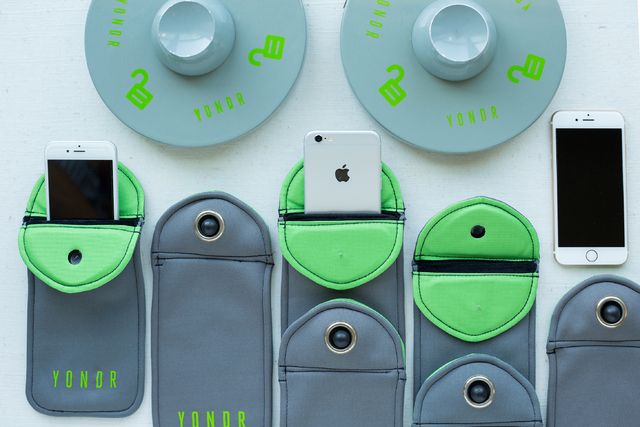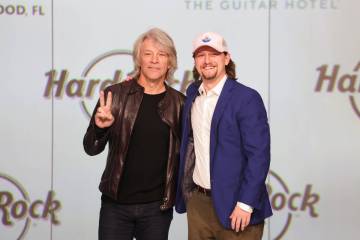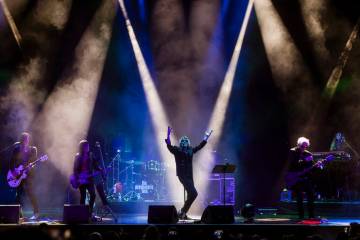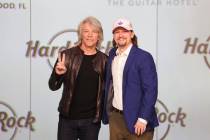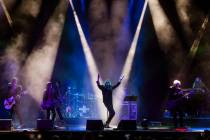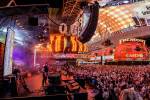Locking cases ensure concerts are phone-free
If a celebrity sighting occurs in Las Vegas and nobody can tweet about it, did it actually happen?
Ask the ballroom full of people who were at Mandalay Bay in June when Justin Timberlake dropped by a Dreamworks promotional event. Phones weren’t allowed, so his appearance barely registered on social media.
Dreamworks rented special locking smartphone cases from a company called Yondr to ensure that clips of the upcoming Timberlake movie “Trolls” didn’t end up online after the event.
Besides Dreamworks, Yondr’s list of clients includes top acts such as Dave Chappelle, Louis CK, Hannibal Burress, Ariana Grande, Alicia Keys, Guns N’ Roses and Prophets of Rage. As more performers seek to regain control over what gets posted on social platforms, Yondr’s business is growing.
While Apple received a patent June 28 for new technology that can disable smartphone cameras, Yondr’s analog solution is simpler and far less invasive.
Fans place their phone inside Yondr’s patent-pending case, a neoprene sleeve that locks when the flap is fastened. Fans keep the case with them. Although it remains locked within a designated area, it can be unlocked at anytime at stations throughout the venue.
Yondr’s 29-year-old founder, Graham Dugoni, said he came up with the idea for his case about five years ago. Inspired by authors like Martin Heidegger — who believed that memorable experiences require being actively engaged — Dugoni saw smartphones becoming an increasing distraction at concerts and decided to do something about it.
Artists have also been increasingly outspoken about concertgoers’ obsession with the small screen instead of the stage.
In May, Adele stopped a show in Verona, Italy, to insist a fan put away a camera, saying, “Because I’m really here in real life, you can enjoy it in real life, rather than through your camera.” In July, Slipknot frontman Corey Taylor knocked a phone out of the hand of a texting fan, and Kenny Chesney devoted an entire song to the topic on his latest album.
“It’s a sea of cellphones being held up, people looking into the camera — and not at the people playing,” Chesney said recently via email. “People are so busy trying to ‘capture’ the moment, they actually miss the moment!”
Dugoni developed the prototype himself and then worked with a Chinese manufacturer to perfect the design. It took less than six months of revisions to complete, and he started testing the case in 2014 at a club in Oakland, California.
The cases have been growing in popularity as more artists insist venues adopt the technology. Chappelle introduced Yondr to club owner Wende Curtis of Comedy Works in Colorado when he played a set of secret shows this past spring.
Curtis said she noticed instantly how much better the crowds were thanks to the cases. That prompted her to purchase her own Yondr system to use at the club full time.
Curtis didn’t recall how much the system cost (“It was thousands of dollars, but it wasn’t tens of thousands of dollars,” she noted), but she said it was worth the investment.
Artists rent the cases for as little as $2 per unit. It’s not much more for venues to purchase ($15 per case and $50 per unlocking station). Shipping is subject to standard rates, and Yondr will provide a staff member on-site for $300.
Some customers initially resisted the idea, Curtis said, but that changed once when they used the cases. The experience was better for everybody. “I think you can talk to any of the artists and they would tell you that there’s a difference,” she said.
As the company grows (Yondr will have 20 employees by fall), Dugoni says he’s interested in adding clients in Las Vegas. So far Dreamworks has been the only customer in the area.
According to John Nelson, senior vice president of AEG Live Las Vegas, his company isn’t likely to seek out the system unless an artist specifically asks. “I don’t think the venue, on our own, would make that decision,” he said, “especially here in Vegas.
“This is a place where people — as long as they’re not hurting somebody else — can kind of do whatever they want to,” said Nelson, whose company is a partner at T-Mobile Arena and operates the Colosseum at Caesars Palace (capacity 20,000 and 4,298, respectively).
Chris White, vice president of the Brooklyn Bowl, a smaller venue on the Strip, expressed similar sentiments. “Our goal every night is to create experiences for people that are memorable. We don’t want to kill the vibe. Unless people started ruining the experience for other people around them, then we’d have no issue with it.”
In addition to concerts, Yondr provides its cases for private events such as weddings. Consumers can rent the cases at the same rate as artists but have to visit the Yondr website to place an order.



